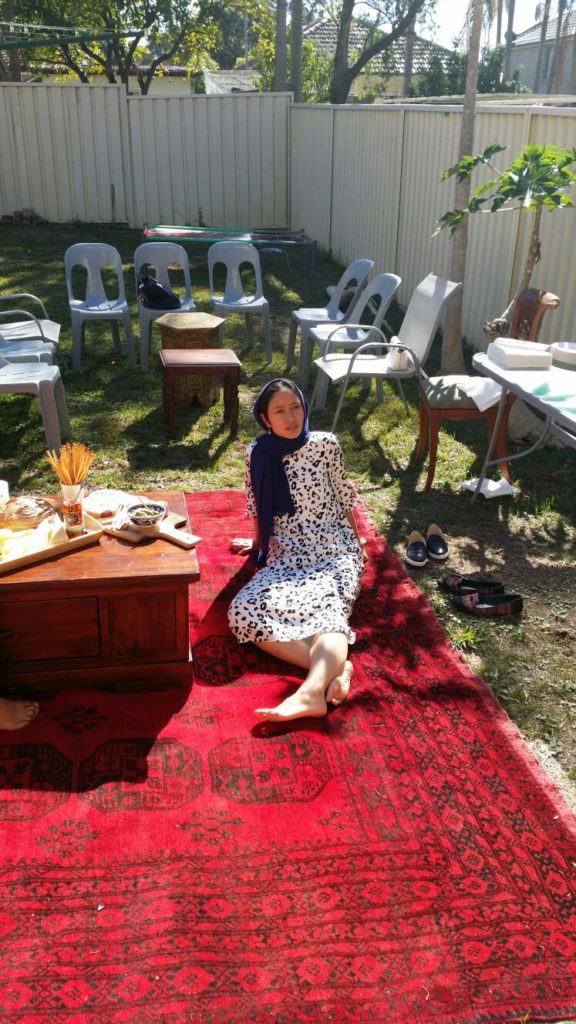Christchurch: A Review
when it’s all over
the lads
the cucks
the incels
the alphas
the edgelords
the streamers
“no hate – but”
“resolution was low”
“sound design was shit”
“combat, one-sided.”
“it just wasn’t believable.”
begin to sweat
unravel
“like, what’s with the kids?”

Vidya: Tell us about your artistic practice.
Aisyah: I began writing therapeutic poetry with Caits Meissner, a Brooklyn-based poet and creator of the “Digging Deep, Facing Self” program. Prior to that, I completed an undergraduate degree in writing and cultural studies at UTS, where I graduated with a small portfolio of experimental poetry. These two bodies of work formed the basis of my first full-length collection, titled “The Naming”. Looking back, I can see how formative these two experiences were for developing my voice. Playfulness with form, convention, and intimacy are how I warm readers to my poetry.
What prompted this poem?
Like most people, I was staggered by the Christchurch shooter’s choice to livestream his massacre. It was sick, twisted, and most importantly, performative. It honestly reminded me of a first-person shooter game, which reminded me of how many times I have seen black and brown Muslim bodies be target practice on Call of Duty, Homeland, American Sniper—I could go on. So, I asked: if I was to treat this Christchurch tragedy as fiction, as something I’ve seen so many times before, what is the precise point at which reality hits and it becomes starkly obvious that this isn’t a game? For me, it’s knowing that the youngest victim was barely a toddler.
How do you see the interplay between poetry and the world of politics, or ‘current events’?
This question makes me think of Craig van Rooyen’s “How To Swim An Elegy”. It’s a beautiful piece, inspired by the news story of the mother orca swimming in the Puget Sound with her dead child. It transformed the way I thought about this story—it echoed with grief, hopelessness, and blame—and left me with a sucker punch I didn’t see coming.
If we believe that emotion and passion and rhetoric play an immediate role in politics, we need to acknowledge that poetry does too. I don’t understand why some people are so eager to strip poetry of its political power. I don’t think it erases it in any way – but it does obfuscate, confuse, and limit poetic commentary. There is a place for self-expression in poetry, but there is also a responsibility for poets to take readers through the interior lives of people who are systematically dehumanised.
I love the destabilising voice of this poem—framing it through a game review, and how that unreality and form collapse to a brutal ending.
Thank you—that unreality was important to me. It was protective, in a way. Every case of fascist and white supremacist violence splinters. So taking that pain and laying bare who is responsible for it, instead of refocusing on the trauma of those still reeling, is empowering.
By relying on video game review tropes, I invite the reader to a place where the shooter and his allies continue their private performer/audience relationship. I expose the complicity of those who gather in the same online spaces as him, laugh at the same jokes, and share the same language by which they recognise each other as peers and allies. By connecting the Christchurch massacre, fascist and white supremacist communities on the internet, and the constant surveillance of brown and black Muslim men, women, and children; I reveal their internal unity and remind the audience that we’ve been here before. Christchurch is only “unbelievable” if you weren’t paying attention. Of course, you may not want to pay attention. That’s what the strikethrough through the last line signals.
What’s your approach to editing as part of process?
It’s fantastic. I take editing advice where I can get it. Having an editor that understands your motive and works alongside you to achieve it is such a privilege. It’s not just about structural support as some may think—which here involved tightening and strengthening the poem, but also relational support which was part of this process—listening, validating, and advocating for the work.
Who are some poets you’re currently reading or commonly turn to?
Recently, I’ve been reading Rainer Maria Rilke and Marlon James. I love Rilke’s commitment to poetry as a spiritual practice, and I love the way James’ fiction sounds ancient, but in a very new kind of way. Mary Oliver is always a favourite I return to.
About the author
vidya rajan is a writer, editor and performance-maker. she currently lives in melbourne and is a writer in residence at the malthouse theatre. you can get in touch on twitter.



